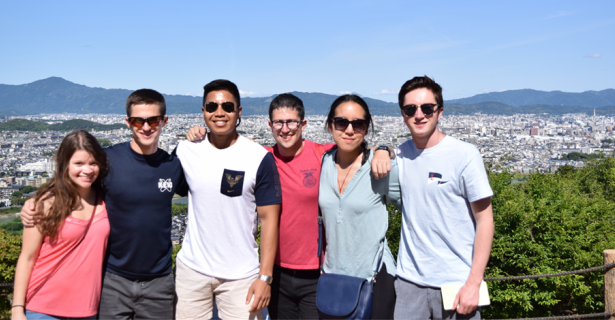When I applied to the Joint Research Project through ALLIES last fall, I didn’t quite know what I was getting into. Over the next few months, through planning meetings with fellow JRP-ers at Tufts and the Naval Academy, and with help from the IGL, our trip and research plans slowly crystallized into form. By spring, we had flights and hotels booked, topics nearly set, and were already meeting with Japanese security experts around the Boston area. As we dove into article after article, poured over our Tokyo guidebooks, and emailed countless contacts in both Japan and the U.S. to try to fill our schedule, we convinced ourselves we were prepared.
Initially, it was the culture shock that was the most jarring. Even though Tokyo is a megacity, it seemed so quiet, so organized. With hardly any knowledge of Japanese, too, it was easy to feel disconnected from my new surroundings. Yet the more we explored, the more I found myself growing to appreciate the safety and orderliness of the country, the politeness yet liveliness of Tokyo, and the kindness of the Japanese people.
Surprisingly, however, the most difficult adjustment was acclimating to the arrival of the military students. While we were so focused on preparing for the trip academically, we lost sight of the other key purpose of the trip: collaboration between civilian and military students. Having arrived a week ahead of everyone else, our group of four Tufts students was used to being its own unit, with the freedom and independence to arrange and go to appointments.
With the addition of the Naval Academy and West Point students, we became a team of 12, and it quickly became apparent that Japan – space efficient as it is – was not built to accommodate such a large group. On some days, we had to hold our team meetings outside, and we gave up on eating dinner all together on some nights. In addition, while I may have interpreted our new rigidly structured schedule and enforced buddy system as an assault on my independence and competence, I eventually understood that it was strategic and safety-oriented, rather than personal. Two quotes meant to explain this: “Why don’t you Tufts students understand that we care about you?” and “What if you get sniped?”.
Another difference was more ideological. Military students are instructed to be apolitical. At Tufts, it’s almost uncommon for a topic to not become politicized. This new mindset, while at first frustrating, offered a refreshing change in perspective from the partisanship and near ideological unity on campus. That, in turn, helped us find new insights into our research in Japanese politics. Particularly after visiting the Hiroshima Peace Memorial Museum, we discussed the ethical decision and justification of the use of nuclear weapons in Hiroshima and Nagasaki, looking from both a military and civilian standpoint. While I can’t justify such a decision, we concluded that, going forward, this shadow of history serves as a lesson and a reminder, a motivation to prevent any such event from occurring in the future, whether through adequate deterrence, or through nuclear nonproliferation and disarmament. A quote meant to lightly summarize this lesson: “Not everything needs to be political”.
After flying more than halfway around the world, and back, it is these lessons in ideological diversity that I remember the most distinctly. Academically, the Joint Research Project was, and still is as I continue to write my analysis, an incredibly rewarding experience. The military, political, and academic figures we interviewed in Japan offered rich and unique insights into Japanese civil-military relations and defense policy, and I look forward to completing my final research paper.
But my personal relationships and interactions with the West Point and Naval Academy students were the most impactful, and I’m hopeful that these lessons can help inform my understanding of the civil-military dynamic going forward, and even into my professional life.

